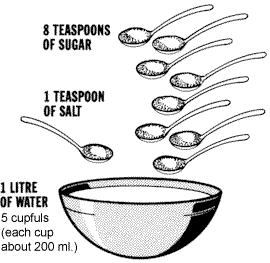FluTrackers Members have collated information from a variety of sources to develop a printable, personal preparation list. This is not an exhaustive list. FluTrackers provides this as a service to help others who may not have stored food before. It is a general guideline only. By reading further, you acknowledge that you are responsible to decide your own potential needs, and those of your family and loved ones.
The following items should sustain one adult for approximately one month. The foods chosen require minimal time and resources to prepare, and represent common and familiar food choices for many. You should customize the list to your personal preferences and needs.
Remember to multiply the amounts of each item on the list by the number of adults you are preparing for.
BASIC PREP LIST FOR ONE MONTH/ONE ADULT
* Water: 30 gallons per person minimum
* Canned meals: 30 cans per person (Pasta meat mixes; Chunky type soups; Chili; etc.)
* Canned/Tinned meat spreads and similar items for sandwiches: 12 cans
* Peanut Butter: 2-3 lbs per person
* Jam/Jelly: 1-2 lbs per person
* Crackers: 4 1 lb. boxes per person (for sandwiches and snacks)
* Canned fruit: 12 cans per person
* Instant breakfast cereal: 30 packs per person
* Vegetable/fruit juices: 1 gallon per person
* Coffee, (2 lb) tea, hot chocolate etc. Consider instant in case no electricity.
* Dry milk: Large box, increase if frequent milk drinker; 2 per child
* Dessert items: Canned or single serve puddings and similar , hard candy, or similar comfort foods and "treats", if funds allow
* Sugar: 5 lbs
* Salt: 1 lb; other spices/condiments as desired
* Baking soda: 1 box
* Tylenol/Acetaminophen: bottle 100
* Ibuprofen: bottle 100
* Multiple Vitamin: 1 bottle/30 day supply
* Prescription Medications: minimum 30 days supply
* Antibacterial soap: 1 per sink
* Hand sanitizer:minimum 1 pocket size and one large to refill from
* Bleach- unscented, 1 gallon
* Vinegar: plain, 1 gallon for disinfectant purposes
* Toilet paper 10-15 rolls
* Paper towels; 6 rolls
* Paper plates, cups, disposable silverware
* Manual can opener
* Camp Stove, sterno or other alternative heating method to boil water and fuel
* Flashlights: One per person minimum, consider LED lights to reduce battery usage. Additional LED headlamps extremely useful.
* Radio: battery powered
* Batteries: 3 to 4 sets per battery powered item
* Fire extinguishers
* Battery operated smoke detectors
* Children specific items: Food, formula, diapers, OTC medicines
One of our members (Nancy) has prepared a chart to assist you with calculating the quantities needed per number of person in your household. A print out of this form is also a handy way to track your purchases. Click here for the list: http://www.flutrackers.com/forum/att...0&d=1162062278
A more comprehensive list can be found here: http://www.flutrackers.com/forum/showthread.php?t=12107
A fully customizable storage inventory calculator in spreadsheet format (MS Excel) may be found here: http://standeyo.com/News_Files/FTP_Files/DFPlanImp.zip (U.S. version) and http://standeyo.com/News_Files/FTP_Files/DFPlanMet.zip (Metric version). Spreadsheet is complements of Stan and Holly Deyo at Millenium Ark.
The following items should sustain one adult for approximately one month. The foods chosen require minimal time and resources to prepare, and represent common and familiar food choices for many. You should customize the list to your personal preferences and needs.
Remember to multiply the amounts of each item on the list by the number of adults you are preparing for.
BASIC PREP LIST FOR ONE MONTH/ONE ADULT
* Water: 30 gallons per person minimum
* Canned meals: 30 cans per person (Pasta meat mixes; Chunky type soups; Chili; etc.)
* Canned/Tinned meat spreads and similar items for sandwiches: 12 cans
* Peanut Butter: 2-3 lbs per person
* Jam/Jelly: 1-2 lbs per person
* Crackers: 4 1 lb. boxes per person (for sandwiches and snacks)
* Canned fruit: 12 cans per person
* Instant breakfast cereal: 30 packs per person
* Vegetable/fruit juices: 1 gallon per person
* Coffee, (2 lb) tea, hot chocolate etc. Consider instant in case no electricity.
* Dry milk: Large box, increase if frequent milk drinker; 2 per child
* Dessert items: Canned or single serve puddings and similar , hard candy, or similar comfort foods and "treats", if funds allow
* Sugar: 5 lbs
* Salt: 1 lb; other spices/condiments as desired
* Baking soda: 1 box
* Tylenol/Acetaminophen: bottle 100
* Ibuprofen: bottle 100
* Multiple Vitamin: 1 bottle/30 day supply
* Prescription Medications: minimum 30 days supply
* Antibacterial soap: 1 per sink
* Hand sanitizer:minimum 1 pocket size and one large to refill from
* Bleach- unscented, 1 gallon
* Vinegar: plain, 1 gallon for disinfectant purposes
* Toilet paper 10-15 rolls
* Paper towels; 6 rolls
* Paper plates, cups, disposable silverware
* Manual can opener
* Camp Stove, sterno or other alternative heating method to boil water and fuel
* Flashlights: One per person minimum, consider LED lights to reduce battery usage. Additional LED headlamps extremely useful.
* Radio: battery powered
* Batteries: 3 to 4 sets per battery powered item
* Fire extinguishers
* Battery operated smoke detectors
* Children specific items: Food, formula, diapers, OTC medicines
One of our members (Nancy) has prepared a chart to assist you with calculating the quantities needed per number of person in your household. A print out of this form is also a handy way to track your purchases. Click here for the list: http://www.flutrackers.com/forum/att...0&d=1162062278
A more comprehensive list can be found here: http://www.flutrackers.com/forum/showthread.php?t=12107
A fully customizable storage inventory calculator in spreadsheet format (MS Excel) may be found here: http://standeyo.com/News_Files/FTP_Files/DFPlanImp.zip (U.S. version) and http://standeyo.com/News_Files/FTP_Files/DFPlanMet.zip (Metric version). Spreadsheet is complements of Stan and Holly Deyo at Millenium Ark.

Comment